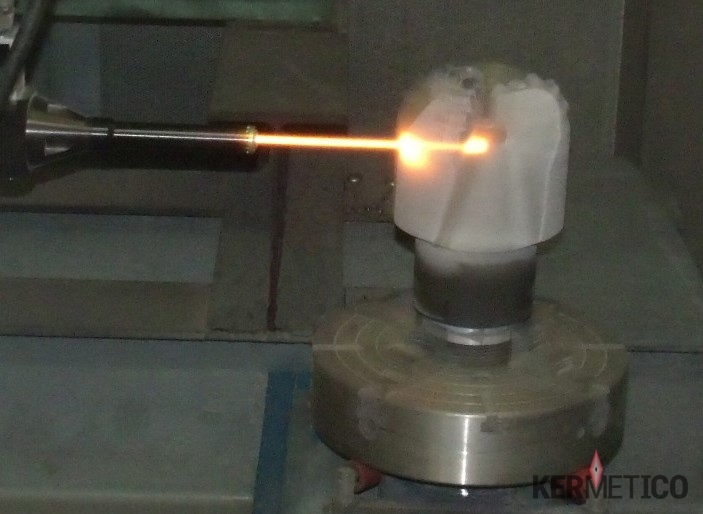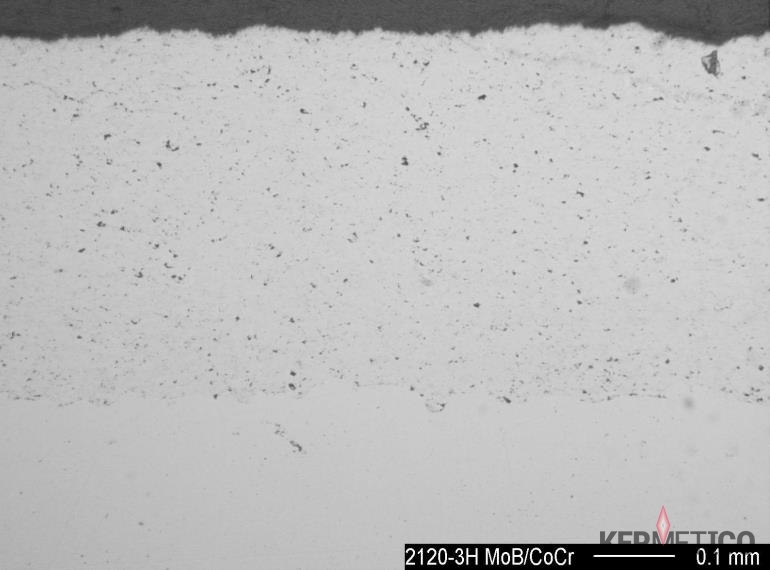Composite Molybdenum Boride – Cobalt Chrome Non-Stick Coating
The Molybdenum Boride coating has good resistance to high temperature erosion and sliding wear.
Thermal shock resistance is fair. General corrosion and high temperature corrosion resistance are very good.
The HVAF MoB coating has excellent non-stick properties.
The coating is inert to molten metals (zinc, aluminum, etc.).
Stock Material: MoB-CoCr Powder, Agglomerated And Sintered
| Nominal composition | wt.% |
|---|---|
| Molybdenum Boride | base |
| Total boron | 8.0-8.5 |
| Cobalt | 25-28 |
| Chrome | 13.5-15 |
Molybdenum Boride Coating Properties
| Feature | S.I. Units | U.S. Units |
|---|---|---|
| Apparent metallographic porosity | <1.5% | |
| Bond strength to carbon steel | 70 MPa @ 500 microns | 10,000 PSI @0.020″ |
| Hardness | 1000-1200 HV300 | |
| Typical as-sprayed roughness Ra: | 2-3.2 µm | 90-130 μin |
| Maximum coating thickness | 750 microns | 0.030” |
| Maximum working temperature | 900°C | 1,650°F |
Molybdenum Boride Coating Characterization
The Molybdenum Boride coating has good resistance to high temperature erosion and sliding wear.
Thermal shock resistance is fair.
General corrosion and high temperature corrosion resistance are very good.
The HVAF MoB coating has excellent non-stick properties.
The coating is inert to molten metals (zinc, aluminum, etc.).
Typical Applications
Sliding wear and erosion at high temperatures, specifically for works related to oil well drilling;
non-stick coatings for a molten metals service (die-casting parts, galvanizing bath parts, sink rolls, etc.).
Non-stick Coatings For Hot Dipping Rolls
MoB/CoCr cermet material with high durability in molten alloys has been developed for aluminum die-casting parts, and for hot continuous dipping rolls in Zn and Al-Zn plating lines, [Mizuno and Kitamura, 2007]. The tests revealed that a MoB/CoCr coating has high durability without dissolution in the molten Al-45wt.%Zn alloy. Using an undercoat is effective in reducing the effect of large differences in thermal expansion between the MoB/CoCr topcoat and substrate of stainless steel AISI 316L, widely used for hot continuous dipping.
MoB-based cermet powders (MoB/NiCr and MoB/CoCr) were deposited on SKD61 (AISI H-13) substrates used as a preferred die (mold) material [Khan et al 2011]. The durability of these coatings on cylindrical specimens against soldering has also been investigated by immersing them in molten aluminum alloy (ADC-12) for 25 hours at 670 °C.
Literature
- Khan F. F., G. Bae, K. Kang, H. Na, J. Kim, T. Jeong, and C. Lee, (2011) Evaluation of DieSoldering and Erosion Resistance of High Velocity Oxy-Fuel Sprayed MoB-Based Cermet Coatings, Journal of Thermal Spray Technology 20(5) 1022-1034
- Mizuno H. and Junya Kitamura, (2007) MoB/CoCr Cermet Coatings by HVOF Spraying against Erosion by Molten Al-Zn Alloy, Journal of Thermal Spray Technology 16(3) 404-413


